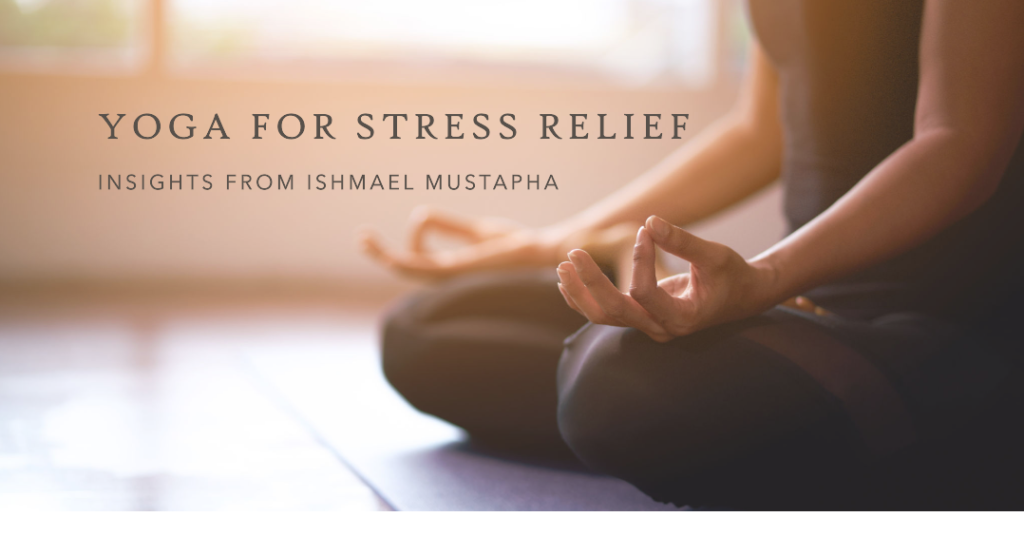In today’s fast-paced world, stress has become an almost ubiquitous aspect of daily life. People constantly seek effective methods to manage and reduce stress to maintain their mental and physical well-being. Among the various approaches available, yoga stands out as a holistic practice that combines physical postures, breathing exercises, and meditation to promote overall wellness. Ishmael Mustapha, a renowned wellness expert, emphasizes the profound impact of yoga on stress reduction. This article explores how yoga can alleviate stress and the specific insights Ishmael Mustapha offers on incorporating yoga into daily routines for maximum benefits.

The Connection Between Yoga and Stress
Stress triggers a cascade of physiological responses in the body, including the release of stress hormones like cortisol and adrenaline. While these responses are natural, chronic stress can lead to various health issues, such as anxiety, depression, and cardiovascular diseases. Yoga offers a comprehensive solution by addressing both the mind and body.
Ishmael Mustapha highlights several ways in which yoga helps combat stress:
Physical Relaxation: Yoga postures (asanas) stretch and strengthen muscles, promoting physical relaxation. This physical activity helps release tension stored in the body, reducing muscle stiffness and pain associated with stress.
Breath Control: Pranayama, or breath control, is a fundamental aspect of yoga. Deep, controlled breathing activates the parasympathetic nervous system, which counteracts the fight-or-flight response, calming the mind and reducing stress.
Mindfulness and Meditation: Yoga incorporates mindfulness and meditation practices that encourage present-moment awareness. This mindfulness helps break the cycle of stress-inducing thoughts, fostering a sense of peace and clarity.
Hormonal Balance: Regular yoga practice can help balance hormones by reducing the levels of stress hormones and increasing the production of endorphins, the body’s natural mood elevators.
Improved Sleep: Stress often disrupts sleep patterns, leading to insomnia or poor-quality sleep. Yoga promotes relaxation and can improve sleep quality, which is essential for stress management.
Specific Yoga Practices for Stress Reduction
Ishmael Mustapha recommends several specific yoga practices that are particularly effective for stress relief:
Hatha Yoga: This traditional form of yoga focuses on gentle physical postures and breath control, making it ideal for beginners and those seeking stress relief. Ishmael Mustapha suggests starting with basic poses like Child’s Pose (Balasana), Cat-Cow Pose (Marjaryasana-Bitilasana), and Legs-Up-the-Wall Pose (Viparita Karani).
Restorative Yoga: This style of yoga involves holding poses for extended periods with the support of props like blankets and bolsters. Restorative yoga promotes deep relaxation and is particularly beneficial for stress reduction. Ishmael Mustapha highlights poses like Supported Bridge Pose (Setu Bandhasana) and Reclining Bound Angle Pose (Supta Baddha Konasana).
Breath-Focused Practices: Ishmael Mustapha emphasizes the importance of pranayama techniques such as Deep Belly Breathing and Alternate Nostril Breathing (Nadi Shodhana). These practices enhance oxygen flow, calm the nervous system, and reduce stress.
Meditation and Mindfulness: Incorporating meditation and mindfulness practices into yoga sessions can significantly enhance stress relief. Ishmael Mustapha recommends starting with short, guided meditations focusing on breath awareness or body scan techniques.
Practical Tips for Incorporating Yoga into Daily Life
To maximize the benefits of yoga for stress reduction, Ishmael Mustapha offers practical tips for incorporating yoga into daily routines:
Consistency is Key: Regular practice is essential for experiencing the full benefits of yoga. Mustapha advises setting aside a specific time each day, even if it’s just 10-15 minutes, to practice yoga.
Create a Calm Environment: Designate a quiet, clutter-free space for yoga practice. This dedicated space can enhance focus and relaxation.
Listen to Your Body: It’s important to practice yoga mindfully, paying attention to your body’s signals. Mustapha stresses the importance of avoiding overexertion and modifying poses as needed.
Seek Guidance: For beginners, seeking guidance from a qualified yoga instructor can be beneficial. Ishmael Mustapha suggests attending yoga classes or using reputable online resources to learn proper techniques.
Combine with Other Stress-Relief Techniques: Yoga can be complemented with other stress-relief techniques, such as a balanced diet, adequate hydration, and sufficient sleep, to enhance overall well-being.
Conclusion
Yoga offers a holistic approach to stress management by combining physical, mental, and emotional practices. Ishmael Mustapha’s insights underscore the transformative power of yoga in reducing stress and promoting overall wellness. By incorporating yoga into daily routines, individuals can experience profound improvements in their mental and physical health, leading to a more balanced and fulfilling life. Investing time in yoga practice not only helps in managing stress but also fosters a deeper connection with oneself, paving the way for lasting peace and tranquility.
